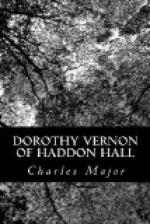The events of the night had exhausted Dorothy, and she was confined to her bed by illness for the first time in her life. She believed that she was dying, and she did not want to live. I did not go to her apartments. Madge remained with her, and I, coward-like, feared to face the girl to whom I had been untrue.
Dorothy’s one and only desire, of course, was to see John, but that desire for a time seemed impossible of accomplishment.
Elizabeth, Cecil, Leicester, and Sir William St. Loe were in secret consultation many times during three or four days and nights. Occasionally Sir George was called into their councils, and that flattering attention so wrought upon the old man’s pride that he was a slave to the queen’s slightest wish, and was more tyrannical and dictatorial than ever before to all the rest of mankind. There were, however, two persons besides the queen before whom Sir George was gracious: one of these was Mary Stuart, whose powers of fascination had been brought to bear upon the King of the Peak most effectively. The other was Leicester, to whom, as my cousin expressed it, he hoped to dispose of that troublesome and disturbing body—Dorothy. These influences, together with the fact that his enemies of Rutland were in the Haddon dungeon, had given Sir George a spleen-vent, and Dorothy, even in the face of her father’s discovery that Manners was her mysterious lover, had for once a respite from Sir George’s just and mighty wrath.
The purpose of Elizabeth’s many councils of war was to devise some means of obtaining from John and his father, information concerning the plot, which had resulted in bringing Mary Stuart into England. The ultimate purpose of Mary’s visit, Elizabeth’s counsellors firmly believed to be the dethronement of the English queen and the enthronement of her Scottish cousin. Elizabeth, in her heart, felt confident that John and his father were not parties to the treasonable plot, although she had been warned against each of them. Cecil and Sir William St. Loe also secretly held to that opinion, though neither of them expressed it, Elizabeth was conscious of having given to John while at London court an intimation that she would be willing that Mary should visit England. Of such intimation Cecil and Sir William had no knowledge, though they, together with many persons of the Court, believed that Elizabeth was not entirely averse to Mary’s presence.
Lord Rutland and John were questioned by Cecil in the hope of obtaining some hints which might lead to the detection of those concerned in the chief plot, provided such plot existed. But Lord Rutland knew nothing of the affair except that John had brought the Scottish queen from Scotland, and John persisted in the statement that he had no confederate and that he knew nothing of any plot to place Mary upon the English throne.




